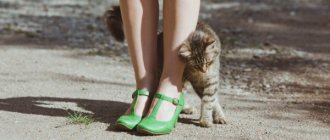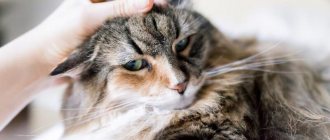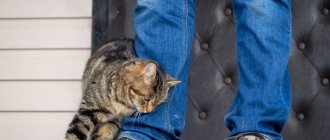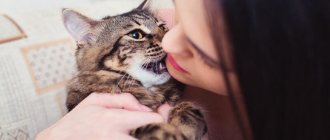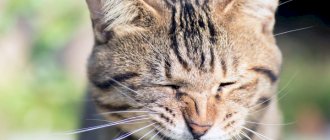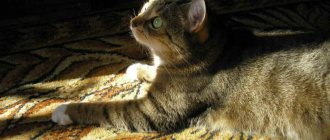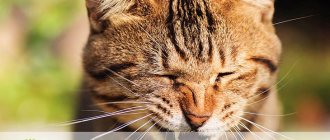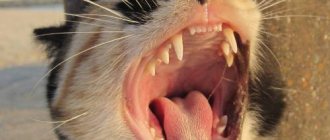Why does a cat rub against a person?
Felinologists note that a cat rubs against its owner’s legs to leave its own unique scent, show affection, or soothe.
It is recommended to encourage the actions of a pet, since an animal that does not receive reciprocal affection will harbor a grudge.
Researchers studying the therapeutic effects of pet therapy speak positively about the effect of purring cats and kittens on the human central nervous system and the functioning of the gastrointestinal tract.
Instinctive behavior
If the cat does not purr or touch its legs with its paw, this means that the animal is expressing distrust, dissatisfaction with the poor conditions in the apartment, or is angry.
Most often, felines rub their heads against human legs 1-2 times a day - in the morning and in the evening. The main reason why a cat rubs itself around its owner, according to felinologists, is to leave marks.
On the cat's face, on the sides of the frontal zone, there are temporal glands that secrete an odorous secretion.
The unique smell, which is not distinguished by the human sense of smell, will be felt by the nose of another animal, therefore the cat is obliged to rub against all surfaces in the apartment, marking the territory.
The cat perceives a person as his property, and therefore constantly rubs his muzzle against his legs, as if against objects, against corners and a bowl. It shows ownership and scares away other members of the cat family. The longer a person is away from home, the more intensely the cat rubs itself on the legs of the pants, as the aroma fades over time.
Other explanations
If a pet puts its head on the owner’s lap, it means that he is trying to improve his condition.
Felinologists also identify the following reasons why a pet rubs against a person’s legs and caresses:
- Treatment. Research conducted at the Max Planck Institute for Human Development has found that cats go after sick people to make them feel better. When a cat pokes its nose into its legs, purrs or lays its head on its knees, it is trying to relieve fatigue, relieve pain and relieve stress.
- Studying. When a person brings various unfamiliar smells into the house, cats intensively sniff and touch clothes, and sometimes poke into the hand to study them better.
- The joy of meeting. If the animal purrs, raises its butt and quivers its tail when it buries its mouth on its legs or face, this means positive emotions and gratitude that the owner has returned home.
- Waiting for affection. A street kitten or a cat that previously lived in the house pets you, asks to be held, and touches your pant legs with its paws to show goodwill, gain attention and protection.
- Removing bad energy. Esoteric teachings, which attribute increased sensitivity to energy flows to cats, claim that kittens and adult cats take away the bad power of Sha and transfer it to the ground.
- Destroying other cats' marks. The animal wipes away other people's odors and marks the owner with its saliva.
Why shouldn't it be driven away?
According to superstitions, cats rub and give paws only to good people, and guests who harbor a grudge will be ignored or attacked. After contact with a bad person, the animal usually wipes itself for a long time and licks its paws.
Rubbing against the owner's face is considered a particularly valuable sign of attention from a pet.
It is not recommended to drive away a pet that approaches with good intentions for the following reasons:
- The cat will hold a grudge. Animals cuddle, showing care and love, and therefore an aggressive or indifferent reaction from the owner will upset them. The cat needs to be petted and encouraged. It is especially important to pay attention if your pet rubs its muzzle against its face.
- Refusing treatment provided by a pet is stupid. The animal will quickly relieve fatigue and give strength.
- According to early Orthodox traditions, felines should be respected because animals have holiness. If a cat rubs against a person, then this is a favorable sign, indicating the protection of higher powers, which should not be disrespected.
Is there any harm?
Cats that rub their noses on people do not cause harm to health, but they often leave traces of saliva. If the owners do not like to constantly wash their clothes, this behavior will cause discomfort. Copious secretion of saliva, which fills the mouth in a few seconds, indicates overexcitation of the animal’s central nervous system.
It is recommended to show the cat to a veterinarian if the cat first rubs against its legs, smearing its pant legs with saliva, and then lies down on the floor and falls asleep. Sleep is usually restless, and the animal constantly twitches its paw.
Due to overwork, cats become apathetic, coordination is impaired, heart rate increases, and breathing becomes difficult.
To relieve negative symptoms, veterinarians prescribe pheromones, which can be purchased from pet stores. When a cat sniffs the products sprayed indoors, it calms down. For severe neurological disorders, the use of feline sedative medications is indicated. To accurately identify diseases, it is necessary to take a urine and blood test.
Source: https://InfoKotiki.ru/soderzhanie/deystvia/pochemu-koshka-tretsya-ob-cheloveka.html
How face rubbing (or bunting) works
If you spend 24 hours observing a cat, you will notice that face rubbing behavior seems to know no bounds. The procedure for releasing pheromones follows a similar pattern.
The process begins with a smell test. Cats have a powerful sense of smell that is more than 1400% superior to humans. The cat will first inhale the item deeply to detect other lingering odors, or to see if her scent is fading, or if another cat has recently visited. In both cases, before leaving, the cat “applies” its pheromones to strengthen the signal.
The cat then rubs its cheek, mouth and forehead against the object to release pheromones and expand the perimeter of its territory. Cats can "claim" anything they find comfortable to rub against, including:
- corners (tables, sofas, walls, doors, desks, chairs, etc.).
- Shoes, clothes or clean underwear
- People (arms, legs, feet, etc.)
- Valuables such as blankets or bed linens
- Brand new things (to claim them)
- Exterior items (hoses, sheds, garages, house siding, trees, etc.).
As the distinct scent of a kitten eludes our noses, we will never know how highly developed these marking instincts are. Most likely, the question will be: “What didn’t your cat say?” Ideally, most of these marks will pass under your radar (i.e. not spread out).
Why you can't shoo away cats when they rub against you
1:5041:509
A cat is an affectionate, dependent and at the same time freedom-loving animal. Each person takes a small pet into their home for different reasons. Some people need a cat to catch mice, others to absorb negative energy, and still others bring a pet into the house as a full member of the family. But everyone has undoubtedly observed the phenomenon when a cat rubs against a person and surrounding objects.
1:1188
Why do cats rub against different objects?
2:17692:4
Absolutely all pets rub against everything in the house, thus the pets mark their territory.
After such a walk around, objects in the house receive a smell familiar to the animal. And when everything in the house smells like a cat, she feels safe. For a person, this smell is invisible, but if a strange cat gets into the house, it will clearly feel that it has entered someone else’s territory. With people it’s a different story. Cats rub against their owners for two reasons.
1. The cat marks the owner
2:8823:13863:1389
When cats rub against their owners' legs, they leave their scent on them.
3:15393:4
If a cat rubs its muzzle, body, tail against a person’s legs, and at the same time purrs, it means it is marking you too.
Pets regard their owners as part of their territory, so the scent of your pet must be present on you.
3:458
Sometimes cats pee in their owners' shoes. Many people have a negative attitude towards this, but the explanation for this is quite simple. The pet urinates in shoes to leave its scent on the owner. It’s inconvenient to pee on the owner himself, but in slippers it’s just the thing.
2. The cat shows concern
3:9514:14554:1458
Such a gesture can be a manifestation of concern for the owner. Scientists have proven that a cat rubs against its owner, thereby relieving him of poor health, mood and anger.
4:1783
This behavior can be easily noticed when returning from work. The pet meets you and begins to rub against you. It removes from the owner all the negative energy that he has accumulated outside the home.
4:336
Why can't you drive a cat away from you?
5:917
There are three opinions: why you shouldn’t drive pets away from you:
• By rubbing against you, wrapping its tail around your leg, the cat shows its care and love towards you. If you drive an animal away from you, you will greatly upset it and cause it pain.
Most often, cats treat their owners like parents. They cuddle up to you, trample you with their paws, and purr when you pet them. A kitten behaves exactly the same way with its mother.
And when you drive away your pet, you leave him perplexed: why is the person closest to me driving me away?
5:18826:507
• People are skeptical about the second version. They say that cats can heal. Some people don’t believe this, but others are convinced of this every day.
In our country, this is not given much attention, but in Western countries there is even “animal therapy” and “pet therapy”. Translated, this means treatment with animals.
When a cat rubs against your legs, it not only removes negative energy, it also relieves fatigue from them. Therefore, you should not drive away an animal that is trying to help you and ease your suffering.6:1454
Cat and Christianity
6:15006:47:512
The third option reminds us of the attitude towards cats in Christianity.
7:642
• In Orthodoxy, domestic cats have always been revered and respected. In the houses they were given a good and cozy place. The cats were never beaten or abused.
7:895
• Christians considered cats to be great divine creatures who escorted the dead to the world of death. • There were beliefs among the people that such pets were marked by the Virgin Mary herself.
7:1240
Cat with the letter M
8:1776
• In references to the early stages of Christianity, cats were depicted next to saints, so people often prayed to them. • During the plague epidemic, Francis of Assisi was saved by a cat from a rat that was infected with the plague.
From that moment on, services began to be held in churches in honor of these pets.
• There is an unusual story in history about the city of Limassol. This city was attacked by snakes. And it was cats who saved the city from the invasion of these reptiles.
Since that time, many cats have lived in this city. They are revered, respected and pampered with tasty treats.
8:9488:953
Conclusion
8:9808:985
Many people do not believe in all this, but some respectfully accept all these versions. But everyone agrees on one thing. If you have adopted a cat in your home, then the responsibilities of raising and caring for it fall on your shoulders. If, when a cat shows love, you respond in kind, then your pet will thank you more than once by catching a mouse or relieving the tension from your legs.
9:21489:4
9:109:15
Source: https://jenskiymir.com/zhivoy-mir/domashnie-lyubimcy/7067-pochemu-nelzya-otgonyat-koshek-kogda-oni-trutsya-ob-tebya.html
Cat body language: emotions expressed without words
Cats can't talk because they don't need to. They are quite capable of expressing all their emotions through body language and facial expressions. That is why communication with a cat comes down to understanding its gestures and actions, which can be a whole spectrum.
Cat body language consists of communication using the head, ears, paws, tail, posture and, of course, the eyes. At the same time, communication with a cat should be based on understanding the complex of all gestures as a whole, besides, the animal always tries to express its emotions quite unambiguously.
Conventionally, the body language of cats can be divided into two groups - gestures that are directed directly at the owner (the cat licks his hand, hisses, rushes, rubs), or those that the cat makes as if in relation to itself, but so that the owner I could understand her easily.
The cat is rubbing
There are not many reasons for this phenomenon. The funny behavior of a pet usually touches the owners, but sometimes tires or irritates them. For example, if a cat not only rubs against the owner’s legs or personal belongings, but also slobbers on them. But only true cat lovers want to understand the intricacies of their behavior. Because exactly how the cat rubs you can judge the reasons for its behavior.
The cat may rub its muzzle against its owner's legs, arms or face. The cat can rise up, as if jumping, and rub against various objects. A cat can rub its muzzle and side against a person, while purring affectionately.
A cat may rub as if butting its muzzle against a person's face. The animal may rub its butt on the floor, as if repenting on the floor. Sometimes a cat rubs its back against the ground and dusty “puddles”, as if rolling out in the dust.
These actions are performed for different purposes and for different reasons.
The reasons for this behavior of the animal
Cats are territorial predators. They mark their territory with urine and specific odorous substances that are secreted by endocrine glands. For cats, smell is a “friend or foe” recognition system.
The cat's whiskers, that is, its whiskers, are covered with such volatile compounds. There are glands on its face that secrete substances so that the cat can mark its territory, objects and people that belong to it.
The pet quite sincerely believes that people belong to her, and not vice versa. Therefore, the cat rubs its muzzle, standing up on its hind legs, and as if falling forward. This way it activates the glands that secrete odorous substances.
In a similar way, she rubs against the corners of buildings and cabinets, various objects and the legs of her owner. When meeting a person from work, she tries to destroy other people’s unpleasant odors on his clothes and skin, trying to “reward” him with “her” smell, the aroma of pride.
The cat rubs against its personal belongings almost every day: food tray, house, etc.
Kittens and young cats that have not had time to assert themselves rub against a person’s hands, poke their faces into his arms or legs, because they need protection and patronage. They caress, hoping that in return the person will give them protection and make them a companion.
Although the cat is considered to be a "walking on its own" animal, it is social to a certain extent. That is, it needs communication.
A domestic cat can satisfy its need for communication and energy exchange only by playing with its owner. Or by climbing onto his lap and allowing himself to be caressed.
With a lack of attention, the animal can vigorously rub not only against the owner, but also various objects, fidget around the floor, attracting attention.
By rolling in the dust and shaking the ground, bathing in “puddles” of dust, the animal may try to remove static electricity that periodically accumulates on the fur.
Some breeders notice that a new thing in the apartment causes increased interest in the cat. She sniffs it, rubs her muzzle against it. The reason for this behavior is also the smell that comes from the new thing. The cat tries to make the thing “its own” on its territory, in addition, this is how the animal gets to know the new thing in the house.
A cat may rub against its owner's legs in the kitchen if it is very hungry or wants to try a delicacy from the table. This is how she shows her request, showing affection mixed with persistence.
The causes of friction are not always harmless. It happens that this behavior is caused by pathological conditions that cause discomfort to the cat.
Friction is pathological if it is intrusive in nature, the animal gets tired of it and wears out the skin to small abrasions.
Normally, the animal falls at the owner’s feet or objects in the house no more than 2-4 times a day. In diseases, friction occurs almost hourly and lasts for a long time.
By the way, in this case, the cat usually rubs not only its muzzle or body, but also its anal area on the floor, its head on the walls, and rubs its own parts of the body with its paws.
With pathological friction, the cat’s behavior also changes, and other symptoms are added. The owner should pay close attention to the cat’s condition if the following symptoms are observed:
- the cat has become lethargic and apathetic, or, on the contrary, it is overly intrusive, and aggressiveness may appear;
- the animal does not purr when rubbed, plaintive meows may appear;
- the cat refuses to eat and does not allow the sore spot to be touched;
- lacrimation appears, eyes and ears fill with pus;
- Vomiting and diarrhea appear.
Pathological friction is a sign of itching or discomfort that can be caused by:
- parasites;
- ear mites, due to which cats experience severe itching;
- inflammation of the glands of the anorectal zone;
- constipation associated with bowel disease, foreign objects and other problems;
- pain in the eyes as a result of injuries and inflammatory processes (in this case, the cat will rub its muzzle against the corner and continuously touch its muzzle and eyes with its paws);
- when there is pain in the ear, the cat will press the sore spot to the ground or floor and try to rub it in this way, while breeders often note a plaintive meow;
- an allergic rash causes severe itching all over the cat’s body, so the animal can rub not only its head, but also its body, roll on the floor, turning from side to side;
- pain in the head is manifested by a desire to rub the top of the head against various objects and the hands of the owner.
A swallowed plastic bag is especially dangerous for an animal. It can clog the intestines, interfering with the movement of food and its digestion. It can partially block the intestines and even partially protrude from the anus, irritating the receptors of the anorectal zone. The worst thing is that swallowed polyethylene is not visible on x-rays. And this problem is difficult to determine even for a specialist.
Sometimes cats, especially long-haired ones, rub contaminated areas of their bodies against objects in an attempt to clean themselves. This is especially noticeable when the cat rubs its butt on the floor, jumps up, and tries to reach the anus. Most often, this behavior is caused by the fact that part of the feces is entangled in the fur and irritates the animal.
Long-haired cats have another problem. If they are not combed out in time, the fur can become matted and block the anus, interfering with bowel movements. In this case, the cat may rub its butt in an attempt to empty its bowels.
Symptomatic treatment
If, along with friction, other alarming symptoms appear, the cat should be shown to a specialist. When the correct diagnosis is made and after adequate treatment, the pathological friction will disappear.
To eliminate allergic itching, you need to identify the allergen and eliminate it from the animal’s life as quickly as possible. To quickly relieve symptoms, antihistamines are prescribed.
If the friction is associated with stress or excessive anxiety of the cat, it should be calmed down. Light preparations in the form of valerian or motherwort will have a beneficial effect on the animal.
When abrasions and scratches appear on the animal’s body due to pathological friction, they should be treated with antibacterial drugs, but strictly after consulting a specialist.
It also wouldn’t hurt to introduce a complex of vitamins and microelements into your diet. Thanks to this, the fur on the damaged area will be restored, the animal will get stronger, and the cat’s mood will improve.
Symptomatic diet and procedures
If the cat needs the attention of the owner, this does not require treatment, you just need to spend 15-20 minutes playing with your pet. A person is responsible for those whom he has taught. And his responsibility is not only to feed and treat the pet, to provide him with decent living conditions, but also to create psychological comfort for him.
Parasites require special antiparasitic therapy. If a cat has constipation, the animal should be taken to a veterinarian to clarify the diagnosis, proper treatment, and select a diet.
If the cat is long-haired, its fur needs to be looked after in a timely manner.
If the animal behaves inappropriately after visiting the tray, you need to examine it, and if lumps of feces are found under the tail, simply remove them.
It is worth carefully monitoring the condition of the skin, eyes and ears of your pets. To prevent diseases, the animal must be shown to the veterinarian at least once a year.
A cat's diet should be varied; you should not feed your cat low-grade food and semi-finished products.
Thanks to the observance of these simple rules, the cat will rub against the owner’s legs solely in connection with surges of tenderness, the desire to leave its mark on the territory and if it is in a good mood.
Cat Rubbing
Source: https://nld.ru/koshki/bolezni/simptomy/tretsja/
Symptomatic diet and procedures
If the cat needs the attention of the owner, this does not require treatment, you just need to spend 15-20 minutes playing with your pet. A person is responsible for those whom he has taught. And his responsibility is not only to feed and treat the pet, to provide him with decent living conditions, but also to create psychological comfort for him.
Parasites require special antiparasitic therapy. If a cat has constipation, the animal should be taken to a veterinarian to clarify the diagnosis, proper treatment, and select a diet. If the cat is long-haired, its fur needs to be looked after in a timely manner. If the animal behaves inappropriately after visiting the tray, you need to examine it, and if lumps of feces are found under the tail, simply remove them.
It is worth carefully monitoring the condition of the skin, eyes and ears of your pets. To prevent diseases, the animal must be shown to the veterinarian at least once a year.
A cat's diet should be varied; you should not feed your cat low-grade food and semi-finished products.
Thanks to the observance of these simple rules, the cat will rub against the owner’s legs solely in connection with surges of tenderness, the desire to leave its mark on the territory and if it is in a good mood.
Why you can't shoo away cats when they rub against you
A cat is an affectionate, dependent and at the same time freedom-loving animal. Each person takes a small pet into their home for different reasons.
Some people need a cat to catch mice, others to absorb negative energy, and still others bring a pet into the house as a full member of the family. But everyone has undoubtedly observed the phenomenon when a cat rubs against a person and surrounding objects.
Why does a pet do this, and is it possible to drive it away from you? Let’s figure it out in this article.
Why do cats rub against different objects?
The fact that cats rub against furniture means that they are marking their territory. Absolutely all pets rub against everything in the house, thus pets mark their territory.
After such a walk around, objects in the house receive a smell familiar to the animal. And when everything in the house smells like a cat, she feels safe.
For a person, this smell is invisible, but if a strange cat gets into the house, it will clearly feel that it has entered someone else’s territory.
With people it's a different story. Cats rub against their owners for two reasons.
The cat marks the owner
When cats rub against their owners’ legs, they thus leave their scent on them. If a cat rubs against a person’s legs with its muzzle, body, tail, and at the same time purrs, it means it is marking you too.
Pets regard their owners as part of their territory, so the scent of your pet must be present on you.
British cats have a strong character, but they are not averse to rubbing against their owner’s legs! Sometimes cats pee in their owners' shoes. Many people have a negative attitude towards this, but the explanation for this is quite simple. The pet urinates in shoes to leave its scent on the owner. It’s inconvenient to pee on the owner himself, but on slippers is just the thing.
The cat shows concern
In addition, such a gesture can be a manifestation of concern for the owner. Scientists have proven that a cat rubs against its owner, thereby relieving him of poor health, mood and anger.
This behavior can be easily noticed when returning from work. The pet meets you and begins to rub against you. It removes from the owner all the negative energy that he has accumulated outside the home.
Why can't you drive a cat away from you?
There are three opinions: why you can’t drive pets away from you: You can’t drive a cat away or show aggression towards it. By rubbing against you, wrapping its tail around your leg, the cat shows its care and love towards you.
If you drive an animal away from you, you will greatly upset it and cause it pain. Most often, cats treat their owners like parents. They cuddle up to you, trample you with their paws, and purr when you pet them. A kitten behaves exactly the same way with its mother.
And when you drive away your pet, you leave him perplexed: why is the person closest to me driving me away?
In no case is it recommended to drive the cat away or show aggression, because it demonstrates its care. People are skeptical about the second version. They say that cats can heal. Some people don’t believe this, but others are convinced of this every day.
In our country, this is not given much attention, but in Western countries there is even “animal therapy” and “pet therapy”. Translated, this means treatment with animals. When a cat rubs against your legs, it not only removes negative energy, it also relieves fatigue from them.
Therefore, you should not drive away an animal that is trying to help you and alleviate your suffering.
When cats rub against their owners, they also relieve fatigue and negative energy. Cat and Christianity The third option reminds us of the attitude towards cats in Christianity.
Christians considered cats to be great divine creatures who escorted the dead to the world of death.
Cats were believed to be great divine creatures. In references to the early stages of Christianity, cats were depicted next to saints, so people often prayed to them. During the plague epidemic, Francis of Assisi was saved by a cat from a rat that was infected with the plague.
From that moment on, services began to be held in churches in honor of these pets. In history there is an unusual story about the city of Limassol. This city was attacked by snakes. And it was cats who saved the city from the invasion of these reptiles. Since that time, many cats have lived in this city.
They are revered, respected and pampered with tasty treats.
There were beliefs among the people that such pets were marked by the Virgin Mary herself.
Cat with the letter M. In Orthodoxy, domestic cats have always been revered and respected. In the houses they were given a good and cozy place. The cats were never beaten or abused.
Conclusion
Many people do not believe in all this, but some respectfully accept all these versions. But everyone agrees on one thing. If you have adopted a cat in your home, then the responsibilities of raising and caring for it fall on your shoulders. If, when a cat shows love, you respond in kind, then your pet will thank you more than once by catching a mouse or relieving tension from your legs.
Source: https://megalife.net.ua/2018/10/11/pochemu-nelzya-otgonyat-koshek-kogda-oni-trutsya-ob-tebya/
Why do furry pets lick their skin?
If cats show increased attention to the owner's skin - hands, or face, and especially when they lick armpits, it can be assumed that they need pheromones. The fact is that sweat contains hormones similar to substances with which cats attract the opposite sex. Thus, the pungent smell of sweat has a calming effect for cats. In a similar way, these animals react to catnip, valerian and mint, which have a very relaxing effect on furry pets. It is possible that your pet simply does not have enough salt with sodium and other minerals.
Cats should not be shooed away when they rub against you.
A cat is an affectionate, dependent and at the same time freedom-loving animal. Each person takes a small pet into their home for different reasons.
Some people need a cat to catch mice, others to absorb negative energy, and still others bring a pet into the house as a full member of the family.
But everyone has undoubtedly observed the phenomenon when a cat rubs against a person and surrounding objects. Why does a pet do this, and is it possible to drive it away from you? Let’s figure it out in this article.
The cat marks the owner as his property
Cats are territorial animals. To mark the boundaries of their possessions, they rub against furniture and other objects, trying to convey their individual scent to them. This fate will not escape the owner either. By leaving scent marks on a person, the cat asserts its ownership of the object so that other animals stay away from it.
In the wild, the described tactics reliably prevent conflicts between animals living in adjacent territories. In the case of domestic cats, this is only an echo of instincts inherited from their distant ancestors, the manifestations of which the owner can only come to terms with.
Cats rub their faces. Reasons why you shouldn't shoo away cats when they rub against you
It is no secret that even civilized people are often guided by instincts when communicating. The feeling of control of space near one’s own body is a natural need for safety, and tactile contact is one of the effective means of establishing close relationships.
Thus, it becomes clear why cats rub against their legs. By and large, the animal wants to make sure that you are friendly and show its emotional disposition in return. However, in addition to social reasons, there are some physiological characteristics that determine this behavior of cats.
The big secret of the little beast: why cats rub against their legs
If you watch the animal carefully, you will notice that this gesture has a special order of execution.
First, the cat presses strongly with the temporal part of its head and cheek, then, pressing with force with its whole body, it passes, touching its side, and completes the manipulation by wrapping its tail around its leg.
Raising its muzzle upward and giving you a languid look from its narrowed eyes, the cat repeats the procedure in the same order.
If in a fit of emotion you bend down to stroke her, she will do the same with your hands, pressing firmly with her nose, the edge of her lips and the top of her head. Having greeted the person, the kitty will move aside, sit comfortably and lick its fur with its tongue.
At this point, she will recognize and remember your individual scent, discreetly giving you her marks.
Physiologists explain the reason why cats rub against their legs in this way: on the animal’s body there are special secretory formations, glands that secrete an odor that is elusive to the human sense of smell.
Sharing scents with your immediate environment is important for a sense of familiarity and security. As Kipling’s hero said: “You and I are of the same blood,” which means we will protect each other and take care of our family.
Body fluids that have a special odor are also found in saliva and cat feces.
When the owners pay enough attention to the pet, feed it correctly, comb it, caress it, and pick it up, the cat does not need to assert its superiority and buries its armature bombs in the tray.
If an animal does not feel comfortable and safe enough in its territory, it uses “heavy artillery”, leaving urine marks and piles of feces in unintended places.
Thus, in cases where a cat has stopped relieving itself in the tray, the owners should not punish the animal, but should think about their behavior. It is worth somehow changing your attitude towards the animal, paying more attention to its needs, including emotional ones.
The natural grace of cats and their sweet daily rituals have become so beloved by people that they have almost begun to humanize their pets. An interesting question to consider is why cats rub against human legs. It's so cute, and at first glance it doesn't make any sense.
In the animal world, far from human understanding, having a sensitive sense of smell plays an important role for survival. Much more effective than sight and hearing, the sense of smell helps to sense the approach of prey, a competitor or a sexual partner.
With the help of smells, cats transmit information to each other about the belonging of an individual to a pride, items of personal property, as well as the boundaries of the territory. A secret with an individual smell for each individual helps to mark these boundaries.
The glands that produce a special substance are located in three places:
- Animal muzzle.
- Areas between the pads on the paws.
- Under the tail - at the anus.
Thus, when the cat begins to rub against parts of the owner’s body, he somehow leaves his scent. The same applies to its relatives, as well as various inanimate objects, including the corners of sofas and walls. This behavior means that the pet is marking its property, protecting it from attacks.
“How do cats show their love?”
From this video you will learn what signs of love cats have for humans and whether furry cats miss their owners.
Reasons for behavior
The cat ritual of wiping is somewhat similar to flirting. The pet presses its head against the owner's leg, then rubs its side, and as a finishing touch wraps its tail around the human limb.
The animal performs the same manipulations with the hands of its owner, and sometimes pokes its muzzle in the face.
This behavior has both an instinctive biological and social nature, which developed in the process of adaptation to home conditions.
To better understand cats, it is worth finding out why they continue to perform this ritual. Known reasons include:
- Marks. Just like personal belongings, toys, territory, for a cat a person is his personal property, a member of the family. When the owner is absent for a long time, his sign of belonging to the pride disappears. Purr senses this and begins to rub, correcting the misunderstanding.
- Collects information. This most often happens when guests come to the house. When coming into contact with someone new, the pet scouts the situation for a potential threat. In addition, by leaving its scent on guests, the animal adapts to their presence.
- Communicates with relatives. Domestic cats also have their own post office, and the postman is the owner. If a pet runs up to its human with a fit of tenderness, do not delude yourself. Perhaps the striped neighbor on the floor below conveyed very important news.
- Requires affection. In this case, a conditioned reflex is superimposed on the instinctive basis. It is produced by a kitten when it, marking a large and warm person with its scent, receives affection. As a result, the association is reinforced, and the animal begins to rub when it wants attention.
- He wants to eat. Here, rubbing is also associated with receiving pleasure after the ritual. However, it is not the only sign that the animal is asking to be fed. This is usually accompanied by meowing and a characteristic hungry look.
- Walking. During the period of sexual heat, females leave pheromones on their owners - messages for potential sexual partners. This is especially true for cats that do not go outside.
Interestingly, similar behavior can also occur among street animals. Often cats, on whose territory a person has set foot, thus declare their rights to him and show condescension.
Is there any danger
Having found out why cats rub against people, the next question arises: is it dangerous? If the pet is vaccinated, healthy and lives at home, then such contact will not harm either party. Although in some cases a certain inconvenience may arise, since salivation increases in overly excitable purrs.
But yard fauna can pose a significant threat to humans and their pets. From stray cats you can get:
- virus;
- fungus;
- lichen;
- helminths;
- fleas and ticks.
That is why, for safety reasons, it is recommended to avoid the attention of unknown animals.
A cat is an affectionate, dependent and at the same time freedom-loving animal. Each person takes a small pet into their home for different reasons.
Some people need a cat to catch mice, others to absorb negative energy, and still others bring a pet into the house as a full member of the family.
But everyone has undoubtedly observed the phenomenon when a cat rubs against a person and surrounding objects. Why does a pet do this, and is it possible to drive it away from you? Let’s figure it out in this article.
The fact that cats rub against furniture means that they are marking their territory.
Absolutely all pets rub against everything in the house, thus the pets mark their territory.
After such a walk around, objects in the house receive a smell familiar to the animal. And when everything in the house smells like a cat, she feels safe. For a person, this smell is invisible, but if a strange cat gets into the house, it will clearly feel that it has entered someone else’s territory.
With people it's a different story. Cats rub against their owners for two reasons.
Cat and Christianity
The third option reminds us of the attitude towards cats in Christianity.
- Christians considered cats to be great divine creatures
who escorted the dead into the world of death.Cats were believed to be great divine creatures.
- In references to the early stages of Christianity, cats were depicted next to saints
, so people often prayed to them. - During the plague epidemic, Francis of Assisi was saved by a cat from a rat that was infected with the plague
. From that moment on, services began to be held in churches in honor of these pets. - There is an unusual story in history about the city of Limassol. This city was attacked by snakes. And it was cats who saved the city from the invasion of these reptiles
. Since that time, many cats have lived in this city. They are revered, respected and pampered with tasty treats. - Christians revered cats with a pattern in the shape of the letter “M” on their heads. There were beliefs among the people that Such pets were marked by the Virgin Mary herself
.Cat with the letter M.
- In Orthodoxy, domestic cats have always been revered and respected
. In the houses they were given a good and cozy place. The cats were never beaten or abused.
Why do cats sniff your face while you sleep?
We were all shocked when we woke up to the touch of a cold nose on our cheek. When we open our eyes, we find our cat sniffing our face. It's a rude awakening made even more confusing by the cat's inexplicable actions. Why do cats sniff our faces while we sleep?
Cats sniff us partly to check how we are feeling. With a cat's sense of smell, we can tell a lot about our status by smell. A cat can:
- immediately determine whether we are injured or sick
- Find out the degree of our emotional state
- understand who or what we have recently been in contact with by smell.
- Your cat can also tell if her own scent marks are fading on you.
As for why our cats sniff our faces while we sleep, the most likely answer is ease of access. We tend to shy away from any object that comes close to our face that is beyond our control. Even if we adore our feline companions, we can still shy away when they get in your face. When a cat sleeps, it has the opportunity to sense our state.
How does this happen?
We also advise you to take a closer look at how two cats who sympathize with each other behave. They “knock” their foreheads in the same way, and sometimes even intertwine their tails. At the same time, animals can purr sweetly and make other interesting sounds. When the cat leaves the room, its smell remains in the air for quite some time. So other pussies will quickly realize that the place is occupied or was occupied. Amy Shojai, a specialist whom we often refer to in our publications, regards “butting” as a way to consolidate territorial claims. With the small exception that with “territorial” marks, unique odors are usually applied to inanimate objects. And “butting” the owner is, rather, a great way to say: “You are only mine and no one else’s.”
The kitten expresses love and seeks reciprocal affection
The desire of adult cats to place their scent marks everywhere is quite understandable, but why then do small kittens, who are clearly not yet mature enough to make territorial claims, also rub against their owner’s legs? Felinologists have an opinion on this matter as well.
When an animal rubs its muzzle against someone, it not only transfers its scent to the object, but also performs an important social ritual. In this way, for example, a mother cat communicates with her offspring. For them, the touching of their faces is a way to make sure each other is feeling well, express trust, communicate their readiness to care, and instill a sense of security.
If a kitten gets in the owner’s face or rubs against his neck, this means that the baby subconsciously associates the person caring for him with his mother and expresses love for him in the way he is used to. You need to pet the baby in return. Establishing contact at this level is a very good sign, indicating that a strong trusting relationship will be formed between the animal and its owner in the future.
An animal thanks a person for caring
This version is supported, in particular, by the fact that representatives of breeds considered the most willful and independent (British Shorthairs, Pallas's cats, Savannahs and the like) are not prone to such behavior. You should not expect a similar display of gratitude and tenderness from an animal that has recently been brought into the house and has not yet gained confidence in its new family. No less significant is the fact that cats that previously had the habit of rubbing against their owner’s legs stop doing so if they are offended, upset or dissatisfied with the conditions in which they were placed.
Source
The cat reminds you of feeding or walking time
Scientists have long found out that cats mainly use sign language when communicating with each other. It is not surprising that sometimes pets try to use familiar means of communication to “talk” with their owner. Unfortunately, people are not very sensitive to non-verbal signals sent to them, such as the twitching of the tip of the tail or the movement of the whiskers. Then the best way to start a “conversation” is to poke the owner’s knee with its muzzle or side. The cat purrs loudly and rubs against the person, as if telling him: “Pay attention to me!” What does the pet want to say this way?
A cat tries to give a person his own scent because she doesn't like his.
It also happens that a cat rubs against the legs of a stranger. Does this mean that the animal considers it its property?
According to the observations of animal psychologists, a cat’s desire to convey its smell to someone is not always a sign of friendly disposition. In some cases, the opposite is true. For some reason, the animal finds the guest’s aroma so unpleasant that it desperately tries to cover it with its own.
This is an adaptation mechanism that serves to calm the cat down, so there is no need to apologize to the visitor and drive away the pet annoyingly rubbing against the stranger’s legs. The animal is just instinctively trying to make meeting a new person a little more pleasant for itself, and it is unfair to scold it for this.
It is worth noting that we are talking here exclusively about those cases when the cat does not like the guest’s own, natural smell. If the visitor “smells” of citrus fruits, alcohol, vinegar, onions or garlic that the animal hates, the pet is unlikely to want to make contact.
